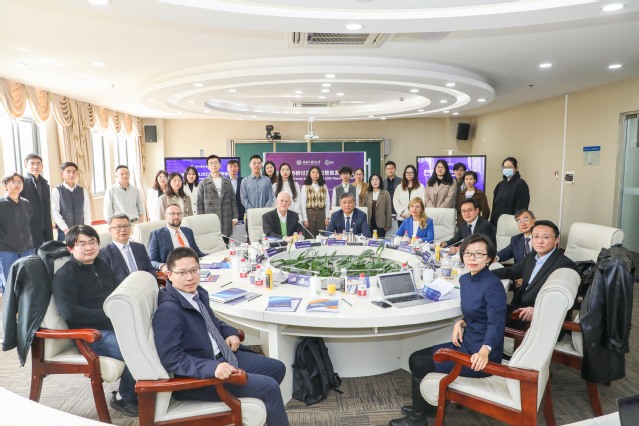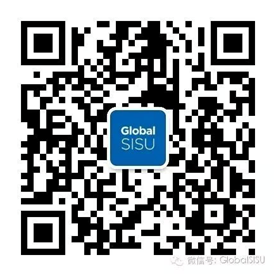
Europe is undergoing the most dramatic change since the Second World War, the iconic event of which is the Russia-Ukraine conflict. The conflict has drawn in most countries both within and beyond Europe, resulting in a global impact. As a result, “the world of the future will no longer be that of the past.” What will Europe be like in the future? What will the world be like in the future? “The transformation of the times” is inextricably linked to “the spirit of the times”, and the future will be shaped and developed by the trends of thoughts.
On the morning of March 8th, the Shanghai Academy of Global Governance and Area Studies (SAGGAS) of SISU and the Center for Sino-German People-to-People Exchange jointly hosted the Seminar on Trends in Europe and 2022 Report Launch. Scholars, former government officials, and business representatives from China and Europe attended to share their observations and discuss ideological changes and social trends of current Europe against the backdrop of European political and economic evolution. In addition to depicting the present situation of Europe, they also tried to explore the trend of future development in Europe. Hu Chunchun, associate professor of SAGGAS, chaired the seminar.
Rudolf Scharping, former president of the Party of European Socialists (PES) and former Minister of Defense of Germany, emphasized in his keynote speech that China and Europe should learn from history and take a long-term view of global development. As regionalization and globalization become increasingly intertwined and complementary, China and Europe must reject the Cold War mentality, avoid protectionism and nationalism, and focus on high-quality and sustainable development. In many areas such as climate change, biodiversity, and food security, China and Europe urgently need to deepen their cooperation, promote mutual benefit, and join hands to tackle global challenges.
Feng Zhongping, president of the Chinese Association for European Studies (CAES) and Director of the Institute of European Studies at Chinese Academy of Social Sciences (CASS), reviewed the changes in Europe’s international status in history and identified the current challenges of Europe, including the Russia-Ukraine conflict, Brexit, migration issues, and COVID-19 pandemic. These challenges were believed to have far-reaching impacts on Europe’s security, economy, and society. In general, at this critical juncture which calls for tough choices, Europe should cooperate with China to address these crises concerning the whole mankind.
Renata Pavlov, National Representative and member of the Executive Committee of the European Union Chamber of Commerce in China, stressed in her speech that there is still great potential for the development of EU enterprises in China thanks to the large scale of two-way investment between China and Europe. In the current context of increasing external uncertainties, it is crucial to boost the confidence of the private sector and enterprises in the EU towards investing in China. Pavlov said that she did not see systemic hostility between China and Europe, which are both partners and competitors, especially in third-party markets. She pointed out that China and Europe’s economy and trade are deeply interwoven and interdependent, and thus both sides need to strengthen exchanges and dialogues to dispel Europe’s current misunderstandings and negative views of China to promote the win-win cooperation.
Ding Chun, president of Shanghai Institute for European Studies and Centre for European Studies in Fudan University, pointed out that in the 2022 China-Europe relations were characterized by “cold politics and warm economy”. In spite of the influence of the Russia-Ukraine conflict, the total trade volume and the mutual direct investment between China and Europe are both on the increase. However, political frictions between the two sides were frequent. Factors contributing to the phenomena above include the rise of populism, the change of the EU’s assessment of China, the US’s growing pressure upon Europe, and the pandemic. In the future, China-EU relations will develop, and so will the competition between them. Both EU’s policy towards China and the US-EU relation will have an impact on China-EU economic relations. The economic cold war between China and Europe can be avoided if both sides seek common ground while shelving differences.
Tobias C. Beck, project manager of the Friedrich Ebert Foundation, declared that, due to the far-reaching impact of the Russia-Ukraine conflict, Europe is looking to China to provide insight in and support to the solution of this issue. EU-China—a strategic outlook released by the European Commission aligns closely with President Xi’s idea of “building a human community with a shared future” at its core. In the post-pandemic era, Friedrich Ebert Foundation is eager to facilitate exchanges, mutual learning and understanding between China and Europe, along with its Chinese partners.
Jiang Feng, SISU’s council chair, director of SAGGAS, and the chief editor of European Trends 2022, believes that Europe has its own self-reflection in the wars, which leads to the recognition that what brings up more horror than bloody combat is the assumption about the destructive power of war. Fear can quickly override logic. Public discussions about the current situation of Europe mainly focus on wars and weapons, while topics on the underlying reasons for the war are marginalized and simplified, and reduced to moral principles of right and wrong. Despite this, Europe has seen some philosophical and sociological reflections that express hope for survival and peace, demonstrating the power of thoughts. While the Ukraine crisis undoubtedly dominates the European situation, it is just part of the topic. Starting early in the modernization of humankind, Europe has encountered related problems also earlier than other areas in the world, thus having a first-hand experience of the negative effects of scientific and social progress. In many respects, Europe is a sample both for understanding the process and troubles of modernization and solving its following problems, which can provide lessons for other parts of the world in their development.
In European Trends 2022, the scholars meticulously analyzed “the spirit of the times” of Europe, despite being geographically distant, conducting a comprehensive survey of significant events and emerging issues in Europe over the past year from various perspectives such as ideology, society, and economy. The report focused on long-term, socially fundamental, and trend-reflecting changes. The main editors of the report, Xiong Wenchi, Hu Chunchun, and Xin Hua presented their research on European ideological trends, European society, China-EU relations, and other related topics.
European Trends 2022 is a series of Chinese-English annual reports on European studies presented by SISU and SAGGAS, with the first trial taking place this year. In the future, the series will be released every year, inviting experts on European studies at home and abroad to share their research reports on the development trend of Europe in areas like ideological trends, society, politics, art and literature.



